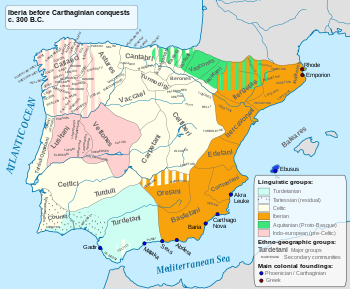
The Lacetani were an ancient Iberian (pre-Roman) people of the Iberian Peninsula (the Roman Hispania). They are believed to have spoken an Iberian language.[citation needed] There remains some doubt whether their naming is not a corruption of either Laietani or Iacetani, the names of two neighboring peoples.[1] Ptolemy located the towns of Aeso/Isona (Guissona) and Setelsis/Selensis (Solsona) among those in a territory, of the Lacetani or the Iacetani.[2] Pliny the elder listed the people as a tributary of Rome in his geographical description of Hispania Citerior.[3] Livy described the location as a district at the foot of the Pyrenees, and north of the river Ebro.[4]
The name is mentioned by some Roman period writers. Surviving mentions in Livy begin the context of the early stages of the Second Punic War, first with the Carthaginian occupation of Lacetania.[5] Secondly, a battle is described and placed shortly after Scipio Africanus's arrival in Hispania in 215 BCE; it tells that Roman forces defeated a Lacetani rescue force, on its way to a besieged Ausetanian city, after Hasdrubal the Carthaginian instigated the Ilergetes to into rebellion and these two peoples had joined.[6] On a later stage of the war, the Lacetani are said to have taken part in the rebellion under Indibilis and Mandonius, who on in this point the text presents as Lacetani rather than Ilergetes,[7] Finally Livy writes of their part in the Iberian revolt of 197-195 BCE, and an attack that Cato the elder led on their city with Suessetani auxiliaries on his side. Incidentally, they are described: "The Lacetani, a remote and forest-dwelling race, were kept under arms, partly by their native savageness, partly by their consciousness of having pillaged the allies in sudden raids while the consul and the army were engaged in the campaign in Turdetania."[8] According to Plutarch, the city harbored Roman deserters, who were sentenced to death after the victory (in marked difference from Scipio's approach), and the battle contributed to the quarrel between the two Romans.[9]
Sallust's Histories has Lacetania as a territory that Pompey claimed to have recovered from Sertorius in 76 BCE.[10] Cassius Dio adds that when Sextus Pompey fled from Hispania Baetica, after the Battle of Munda in Caesar's Civil War, he was able to hide in Lacetania as the people there remembered his father Pompey favorably.
Pliny noted it is a region of abundant vines, that allow the production of second-rate wine.[11] Martial in his epigrams also recalled Laletanian or Lacetanian[12] as a kind of cheap wine.[13]
- ^
 Smith, William, ed. (1857). "Lacetani". Dictionary of Greek and Roman Geography. Vol. 2. London: John Murray.
Smith, William, ed. (1857). "Lacetani". Dictionary of Greek and Roman Geography. Vol. 2. London: John Murray.
- ^ Ptolemy Geographia 2.6.72, reads Akketanoi or Iaketnnoi, but Stückelberger et al note that the Lacetani are probably meant: Stückelberger, Alfred; Grasshoff, Gerd (2017). Klaudios Ptolemaios, Handbuch der Geographie (in German, Ancient Greek, and Latin). Vol. 1. Schwabe. p. 197. ISBN 978-3-7965-3703-5.
- ^ Pliny, Natural History, 3.4. Again, the Loeb edition emended the name to Iacetani.
- ^ Livy, Ab urbe condita Libri 21.23, concerning Lacetaniam (Loeb), var. lect Aquitania/Aquitanos.
- ^ Livy, Ab urbe condita Libri 21.23
- ^ Livy, 21.60-61, concerning Laeetani (Loeb), Lacetanis(/Laeetanis)..Lacetanos (Manuscripts).
- ^ 28.24-29, 28.34, concerning Lacetani (Loeb, which notes however, "Probably Livy means the Laeetani of N.E. Spain in the region of Barcelona.")
- ^ Livy, 34.20, concerning Lacetani/Lacetanos.
- ^ Plutarch, Lives: Marcus Cato [the elder], 11
- ^ Sallust, Histories, [2.82B / 2.98] = "Letter of Gnaeus Pompeius", 2.5 (Loeb Classical Library 1965 edition, pages 416-417)
- ^ Pliny, Natural History, 14.8
- ^ The manuscripts diverge.
- ^ Martial, Epigrams, 1.26; 1.49; 7.53